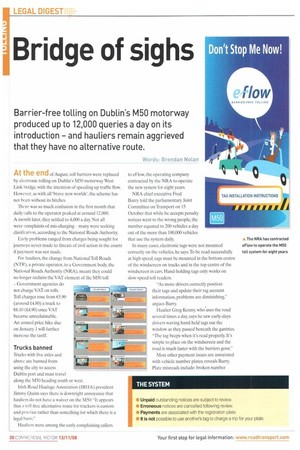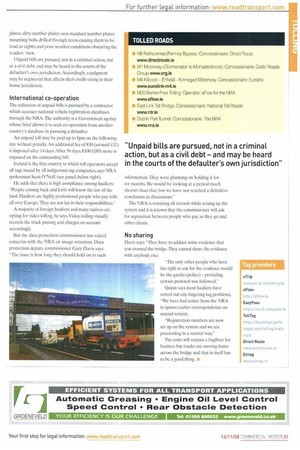Bridge of sighs
Page 30

Page 31

If you've noticed an error in this article please click here to report it so we can fix it.
Barrier-free tolling on Dublin's M50 motorway produced up to 12,000 queries a day on its introduction and hauliers remain aggrieved that they have no alternative route.
Words: Brendan Nolan
At the end of August, toll barriers were replaced by electronic tolling on Dublin's M50 motorway West Link bridge, with the intention of speeding up traffic flow. However. as with all 'brave new worlds', the scheme has not been without its hitches.
There was so much confusion in the first month that daily calls to the operator peaked at around 12,000. A month later, they settled to 4,000 a day. Not all were complaints of mis-charging — many were seeking clarification, according to the National Roads Authority.
Early problems ranged from charges being sought for journeys never made to threats of civil action in the courts if payment was not made.
For hauliers, the change from National Toll Roads (NTR), a private operator, to a Government body, the National Roads Authority (NRA), meant they could no longer reclaim the VAT element of the M50 toll — Government agencies do not charge VAT on tolls. Toll charges rose from €5.90 (around £4.80) a truck to €6.10 (£4.90) once VAT became unreclaimable. An annual price hike due on January I will further increase the tariff.
Trucks banned
Trucks with five axles and above are banned from using the city to access Dublin port and must travel along the M50 heading south or west.
Irish Road Haulage Association (FRHA) president Jimmy Quinn says there is downright annoyance that hauliers do not have a waiver on the M50: "It appears that a toll-free alternative route for truckers is custom and practice rather than something for which there is a legal basis."
Hauliers were among the early complaining callers to eFlow, the operating company contracted by the NRA to operate the new system for eight years.
NRA chief executive Fred Barry told the parliamentary Joint Committee on Transport on 15 October that while he accepts penalty notices went to the wrong people, the number equated to 200 vehicles a day out of the more than 100,000 vehicles that use the system daily.
In many cases, electronic tags were not mounted correctly on the vehicles, he says. To be read successfully at high speed, tags must be mounted in the bottom centre of the windscreen on trucks and in the top centre of the windscreen in cars. Hand-holding tags only works on slow-speed toll readers.
"As more drivers correctly position their tags and update their tag account information, problems are diminishing," argues Barry.
Haulier Greg Kenny, who uses the road several times a day, says he saw early-days drivers waving hand-held tags out the window as they passed beneath the gantries "The tag beeps when it's read properly. It's simple to place on the windscreen and the road is much faster with the barriers gone."
Most other payment issues are associated with vehicle number plates, reveals Barry. Plate misreads include: broken number plates; dirty number plates; non-standard number plates; mounting bolts drilled through zeros causing them to be read as eights; and poor weather conditions obscuring the readers view.
Unpaid bills are pursued, not in a criminal action, but as a civil debt, and may be heard in the courts of the defaulter's own jurisdiction. Accordingly, a judgment may be registered that affects their credit rating in their home jurisdiction.
International co-operation
The collection of unpaid bills is pursued by a contractor which accesses national vehicle registration databases through the NRA.The authority is a Government agency whose brief allows it to seek co-operation from another country's database in pursuing a defaulter.
An unpaid toll may be paid up to ffpm on the following day without penalty. An additional fee of €40 (around £32) is imposed after 14 days. After 56 days. €100 (f.80) more is imposed on the outstanding bill.
Ireland is the first country in which toll operators accept all tags issued by all indigenous tag companies, says NRA spokesman Sean O'Neill (see panel, below right).
He adds that there is high compliance among hauliers: "People coming back and forth will know the law of the land. Hauliers are highly professional people who pay tolls all over Europe. They are not lax in their responsibilities."
A majority of foreign hauliers and many natives are opting for video tolling, he says. Video tolling visually records the truck passing and charges an account accordingly.
But the data protection commissioner has raised concerns with the NRA on image retention. Data protection deputy commissioner Gary Davis says: "The issue is how long they should hold on to such information. They were planning on holding it for six months. We would be looking at a period much shorter than that; but we have not reached a definitive conclusion in discussions."
The NRA is retaining all records while setting up the system and it is known that the commissioner will ask for separation between people who pay as they go and other clients.
No sharing
Davis says: 'They have to adduce some evidence that you crossed the bridge. They cannot share the evidence with anybody else.
"The only other people who have the right to ask for the evidence would be the gardai (police) — providing certain protocol was followed."
Quinn says most hauliers have sorted out any lingering tag problems, "We have had notice from the NRA to ignore earlier correspondence on unpaid notices.
-Registration numbers are now set up on the system and we are proceeding in a normal way:" The costs will remain a bugbear for hauliers but trucks are moving faster across the bridge and that in itself has to he a good thing.












































































































































































